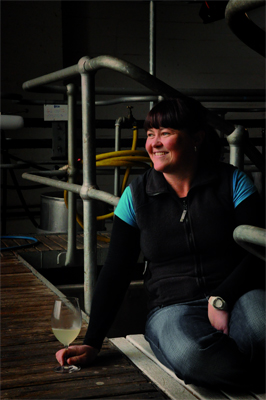Sarah Crowe Senior Winemaker Bimbadgen Interview

Sarah Crowe Senior Winemaker Bimbadgen Interview
In August, Bimbadgen (formerly known as Bimbadgen Estate), high on the hill in the heart of the Hunter Valley, will unveil its new look branding across all its working areas. The fresh new style is just the beginning of several initiatives being rolled out by the winery and its premium on site restaurant Esca Bimbadgen.General Manager of Bimbadgen, Rebecca Poynter said that with the business being so multifaceted, it was important to present a look that could over-arch all of the current units, as well as some exciting future developments.
"We felt that 'Estate' no longer accurately represented a growing business with very diverse interests. We also wanted to create a 'hero' image that would be more representative of the greater Bimbadgen business that communicated the brand's credibility and authenticity. Thus we incorporated the tower, which is highly visible from several parts of the Hunter Valley and is associated with the property by many people."
Under this new direction, Bimbadgen is also taking a strong stance on environmental sustainability; a new bottle is being used that is 28 percent lighter than previous bottles for its wine range, saving 140g per bottle. Across a yearly production, this equates to an approximate 42,000 kilograms of glass saved per annum.
With a fresh look and feel, come sensational additions to the Bimbadgen wine range. Headed up by recently appointed Senior Winemaker Sarah Crowe, who was named the Hunter Valley's 2009 Winemaker of the Year, Bimbadgen's dynamic winemaking team has created two new ranges.
The Bimbadgen Sparkling range, consisting of the popular Sparkling Semillon and new release Sparkling Rose, is a fun and lively twist on classic varieties. Bimbadgen Regions range of wine features a diverse selection of varietals chosen from regions known or identified for their superior quality and expression of flavour.
And what would a lovely glass of the new range wine be without the delectable flavours of Esca Bimbadgen. Esca has just released its highly anticipated winter menu, which will feature incredible gastronomic delights inspired by fresh local Hunter Valley produce.
Signature dishes within Esca Bimbadgen are the Tasting Plates, available in Red and White wine options. These tasting plates offer three 'tastes' from the Esca Menu, presented with a taste of the matching Bimbadgen wine - an introduction to the food and wine matching process.
All of Bimbadgen's exciting new announcements wouldn't be complete without a mention of the 'Day on the Green' concert series. This season of amazing events, held at the property's outdoor amphitheatre overlooking the magical vineyards, has just announced American rock legend Meatloaf to feature on October 8, 2011 and jazz rock legends Steely Dan and Steve Winwood on Saturday, October 22, 2011.
Ms. Poynter continues, "To stand out in a challenging market, means presenting a world class holistic brand. This is not only about its presentation, but about offering a genuinely consistent and premium experience that is delivered by people who live and breathe the brand values.
"Whether they are coming in for a wine tour and tasting, having a special meal at Esca, arranging a corporate function, going to a summer concert, or sharing their wedding day with us, our new team and initiatives across our business will keep all visitors to the Hunter Valley coming back time and time again."

Interview with Sarah Crowe
Sarah Crowe, Senior Winemaker, BimbadgenSarah grew up in the coastal town of Wollongong, New South Wales. She always had an affiliation with the land and enjoyed being outside and working with nature. And as such, Sarah made the decision to study Horticulture after leaving school.
Pursuing her love of the outdoors, Sarah set her sights on the Hunter Valley Wine Region in 2001, commencing work for Brokenwood Wines for what was initially meant to be just a few weeks of learning vine management.
This short term project was enough of a 'taster' for Sarah to fall in love with the Hunter Valley Wine Industry, and by January the following year, she had enrolled in a Bachelor of Applied Science in Viticulture at Charles Sturt University.
Sarah went on to work at Brokenwood Winery during the busiest three months of the 2002 harvest season. Working during vintage made it clear to Sarah that her future was in winemaking, and she never returned to work full-time in the vineyard. Sarah became Brokenwood's Assistant Winemaker in 2004, whilst scheduling International harvests that included time in Oregon in 2004 and 2006, and more recently the Rhone Valley in 2008.
Wine Show judging is an important part of the calendar year for Sarah. She participates in three or four wine shows each year in order to expand her palate and knowledge of industry trends, and to give something back to the industry.
In May 2009, Sarah was the recipient of the Hunter Valley Wine Industry Association's Hunter Legends "Rising Star of the Year" Award. This was a great achievement for Sarah to be awarded such a high honor by her peers and colleagues in the Hunter Valley. This award instigated a new job opportunity for a young Hunter Valley Wine Company called Swish Wine. Sarah was at the helm as Chief Winemaker, whilst overseeing the construction of the company's brand new wine production facility in Lovedale.
In September 2010, Sarah joined the team at Pokolbin based winery Bimbadgen, to the position of Senior Winemaker. This new challenge sees Sarah working on a range of wine varietals across the Bimbadgen range, along with working on two premium Hunter Valley vineyards owned by the winery, being the McDonalds Road Winery Lot, and in particular, the Bimbadgen Palmers Lane Vineyard.
2010 was a huge year for Sarah, she commenced taking part in the Future Leaders Program, a three year innovative course jointly initiated by Wine Australia, the Winemakers' Federation of Australia, the Grape and Wine Research and Development Corporation and Wine Grape Growers' Australia. Participants undertake a series of course components that cover personal leadership, tacit leadership, strategic leadership, international leadership and leading change. Only a select group are admitted each year, as the future leaders of the Australian Wine Industry.
Most recently, Sarah was also one of only twelve people to be accepted into the 2010 Len Evans Tutorial Program, which commenced in November 2010. The Len Evans Tutorial Program is highly regarded and over a five-day period 12 scholars are exposed to the great wines of the world, young and old. There are blind tastings through the course with 30 varietal wines from up to five countries and spanning up to 30 years each day. The sessions are all highly rigorous and the wines are judged as if they were in an Australian wine show.
Question: What does the role of Senior Winemaker at Bimbadgen entail?
Sarah Crowe: Lots of things (laughing). I am responsible for all of the wine production out of Bimbadgen and I also manage the vineyard and grounds.
Question: What inspired you to get involved in the wine making business?
Sarah Crowe: It was a little bit of an accident, my background is Horticulture and I came here to Bimbadgen to do some pruning in 2001 and that was the first time I had ever stepped foot in a vineyard; it was such a great region and the people in this region were really inspiring and I worked in the winery for three months, during the harvest period and I never went back to the vineyard.
Question: What education is needed to become a Senior Winemaker?
Sarah Crowe: I have a Bachelor of Applied Science in Viticulture and I have also done some management and business training; there are some wine makers in the world, and even in this region, who have never been to University and they have learnt 'on the job', through mentoring and other people passing down knowledge to them.
Question: Can you talk about the process that goes into making wine?
Sarah Crowe: Across the world there isn't a whole lot of variation in the wine making process, the process is basically the same with small differences including different ways to approach different grape varieties. The really important thing for white wine is the temperature you harvest it at, the cooler the better. Generally you need to be quite attentive when using white grapes, often white grapes will be harvested during the night, when it is nice and cool which means a really early start, in the winery. With red grapes the temperature isn't as important and that means they are harvest throughout the day, when it is warmer.
Question: What does a typical day, for you, include?
Sarah Crowe: During harvest time I will be in the vineyard, very early, taking samples of the grapes to check their ripeness and tasting them as I go. The chemistry of the grapes is important but the really important thing is that you have flavour when you decide to harvest. Then I will head back to the winery and begin processing quite early because we have been harvesting throughout the night.
I like to drive the fork-lift because then you're driving the whole process throughout the winery and it starts with how quickly you can get your press loaded as to how late you're going to be there, that day. I like to take control and that then stops people wandering off to make coffee. I'm always saying "Let's go, let's go!" As I was saying with white grapes, timing and temperature is very important.
Question: How has Bimbadgen changed since you began working with the company?
Sarah Crowe: Timing for me is crucial, it's not about what is convenient, it's what is best for the product. It's nice to sleep in then come in and make a coffee and then make a start, but that's not what's best for the end product.
I start making additions sometimes in the bins, in the vineyards at the crusher, based on the sampling process and historical numbers that you get out of a vineyard or out of a grape variety. I make additions as soon as possible at the most appropriate step, rather than waiting till after it's all done, in tank and making changes then.
The other thing I have tried to change at Bimbadgen is the way we try and process different grape varieties including an imitation Shiraz and also used a different technique for turning the red ferments over, which is a lot gentler extraction of tannis.
Question: What challenges did you face when creating the two new ranges?
Sarah Crowe: Chardonnay is quite an effort because of the design of this building. I had to get a conveyer to move the grapes through a narrow opening to load the press which is in the middle of the building, on the middle floor. It was a little bit of an effort, but we go there.
Question: What do you enjoy most about your job?
Sarah Crowe: I think I like the fact that it is never the same, each different tank that you look at and taste is quite different depending on where the fruit has come from and how you have processed it. When you blend a wine, it changes it and you'd normally do that to make a better wine. There are a number of different things you can do to improve the quality of the wine including the blending and manipulating the balance of things like alcohol and acidity to make a more palatable wine. Once you bottle something it still continues to change, grow and evolve with bottle maturation.
Interview by Brooke Hunter

MORE



